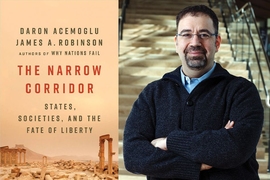“Computers have encapsulated so many collective hopes and fears for the future,” says Marc Aidinoff, a PhD candidate in History/Anthropology/Science, Technology, and Society (HASTS), a doctoral program that draws on the expertise of three fields in MIT's School of Humanities, Arts, and Social Sciences (SHASS).
“In the 1990s, you have Vice President Gore, President Clinton, and the Rev. Jesse Jackson saying that closing the digital divide was a fundamental civil rights issue of our times. What does it mean when civil rights become about access to computers and the internet? When lack of internet access is considered a form of poverty? These are really big questions and I haven’t been able to get them out of my system.”
How is social policy tied to ideas about technology?
Aidinoff has become dedicated to understanding how policymakers have thought about technology. It makes sense. After graduating from Harvard University, Aidinoff worked for Barack Obama's presidential campaign and subsequently joined the administration working as a policy advisor for three years — including a two-year stint as the assistant policy director for Vice President Joe Biden.
“But these questions were getting under my skin,” Aidinoff explains. “I wanted to know how visions for social and economic policy were tied to changing ideas about technology. So I became a card-carrying historian who pokes around archives from Mississippi to D.C., trying to get answers.”
Restructuring the citizen’s relationship to the state
The story in Aidinoff’s dissertation project begins in 1984, with the breakup of the Bell System and the launch of the Macintosh computer. That was also the year the U.S. federal government began measuring citizens’ access to computers. The dissertation traces policies designed to democratize information and the implementation of massive systems built to digitize the U.S. government.
“Networked computing,” Aidinoff argues, “has been part of a larger restructuring of the citizen’s relationship to the state in U.S. history. For example, when you see a welfare caseworker, and there is a computer on their desk — does it matter who wrote that software?”
The Horowitz Foundation for Social Policy presented Aidinoff with its John Stanley Award for History and Ethics earlier this year to support his efforts and fund his research trips.
Aidinoff’s research has sent him searching for some of the same types of information he reviewed and generated as a policy advisor. He lights up when talking about a visit to the George H. W. Bush Presidential Library and Museum in College Station, Texas, to examine a hodgepodge of materials from policy memos to computer manuals. These archives help him understand how information moved around the executive branch and how policymakers would have understood technological systems.
The archive you need
Reading through the documents he locates can be difficult, however; Aidinoff credits the HASTS program for sharpening his research skills so he can home in on what is essential.
“The HASTS faculty are really good at teaching you how to be unsatisfied until you’ve figured out how to construct the archive that you think is right for the question you’re asking. For me, that has meant a lot of newspapers and computer manuals. There’s a real belief among historians of science and technology that you need to go out and construct the archive you need. Archives aren’t just things that are waiting for you to discover. You’re going to need to go out and be creative.”
“HASTS pushed me harder than I expected. I knew MIT would be challenging, but my colleagues encouraged me to spend time in places where I was less comfortable, including rural Mississippi.”
The humanistic/technical synergy at MIT
In fact, Aidinoff spent a semester at the University of Mississippi and the most recent summers teaching college-bridge courses to high school students in the Mississippi Delta with the Freedom Summer Collegiate program — an organization that continues the work of the 1964 Freedom Summer.
For Aidinoff, there is no question that SHASS is the best place to continue his studies. The combination of rich humanities research programs and surrounding science and technology expertise was exactly what he wanted.
“You’ve got such amazing people, world-class historians and historians of science and technology. The people I get to work with in a small, loving, interdisciplinary department is pretty extraordinary. My friends are technical, and being technical is really valued. I hang out with computer scientists all the time, which is great. I couldn’t do what I do if I didn’t have people pushing back on me from a social science perspective and from a technical engineering perspective.”
Aidinoff’s position with the MIT Computer Science and Artificial Intelligence Laboratory’s Internet Policy Research Initiative has complemented the perspective of his home department in SHASS.
Knowledge is social
“A key lesson from the history of science and technology is that knowledge is social. Some knowledge comes from sitting and thinking, and that’s important. But over and over again we learn it’s sitting and thinking and then going and having lunch or a coffee with people in your discipline and across disciplines.
“I don’t think I’ll ever again be in a community with this many historians of science per square mile. It’s just an incredibly exciting community. And it’s social. We think these questions really matter, so it’s worth looking up from the book, too, and having the discussion where you fight about them because these are real live questions with political consequences.”
Story prepared by SHASS Communications
Writer, photographer: Maria Iacobo









